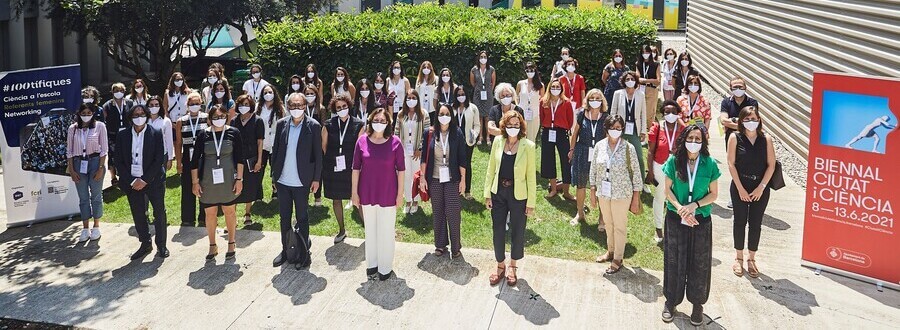
The Barcelona Science Park actively has actively collaborated in the City and Science Biennial
Within the framework of the second City and Science Biennial, for six days, Barcelona has hosted more than 250 activities designed for all audiences with the aim of bringing science to the public and democratize their access. In this new edition, the City Council has had 40 collaborating entities, involving the Barcelona Science Park.
Barcelona Science Park was the place chosen to kick off the 2nd edition of the City and Science Biennial, with the celebration on Tuesday, June 8, of the Agora – Meeting of Schools and Women Scientists about COVID-19, the first of the more than 250 activities that took place throughout the week.
The meeting – organized by the Barcelona Institute of Science and Technology (BIST), the Catalan Foundation for Research and Innovation (FCRI) and the Education Consortium, within the framework of the 100tífiques program – was moderated by researcher Nuria Montserrat, ICREA Professor at the Institute of Bioengineering of Catalonia (IBEC) and curator of the Biennial, and had the participation of Mariona Nadal, postdoc at the Institute for Research in Biomedicine (IRB Barcelona); Mirabai Cuenca, PhD student at the Centre for Genomic Regulation (CRG); Júlia Vergara, Principal Investigator at the Institute for Research in Agrifood Technology (IRTA); and Maria Soler, senior researcher at the Catalan Institute of Nanoscience and Nanotechnology (ICN2).
Joan Subirats, Deputy Mayor for Culture, Education, Science and Community, welcomed the students.
In the framework of the International Day of Women and Girls in Science (February 11, 2021), the 100tífiques program has managed to convene together 458 researchers to share their experience with some 20,000 female students from 483 schools in Catalonia. Because of the pandemic, this year the activity has been held online. During the Biennial, some of these scientists met face-to-face with students from all over Barcelona in different Meetings of schools and scientists. The one held in the Park focused on the investigation of Covid19.
100tífiques meeting
On Thursday, June 10, the Barcelona Science Park hosted the second #100tífiques Meet-up this year, organised by the Barcelona Institute of Science and Technology (BIST) and the Fundació Catalana per a la Recerca i la Innovació (FCRi). The event aims to recognise and make visible those contributions made to science by women researchers and technologists.
The Mayor of Barcelona Ada Colau opened the #100tífiques debate and networking meet-up, where she addressed the participants directly, encouraging them to talk about their research in both public and private settings, “because we need benchmarks, both for individuals and for this community, to build a more inclusive city and society”. The mayor highlighted that globally, women still only make up 30% of all people engaged in research, and asked, “how many brilliant women are we missing?”
The event also included a round table entitled ‘Increasing the influence of women in science’, moderated by researcher Núria Montserrat, ICREA Professor at the Institute for Bioengineering of Catalonia (IBEC) and Commissioner of the Biennial. Speakers Gina Aran, CEO of Inginium, Mónica Roca, President of the Barcelona Chamber of Commerce, Anke Kleff, Psychologist and Member of the IBEC Human Resources Department, and Mónica Garcés, Philosopher and Professor at the UOC, participated in the discussions.
They talked about how the recognition and influence of women’s contributions to research and innovation can be increased, from personal, institutional, and social perspectives, both in the public and private spheres. They emphasised the importance of communication to explain our work but also listen to and value the work of our women colleagues. But above all, they highlighted the need to change leadership models, to avoid copying obsolete models or simply creating “parallel” departments for “women’s” subjects.
14th edition of Science Festival
As a new feature of the second Biennial City and Science, the fourteenth edition of the Science Festival will be held on June 13 on the waterfront of Barcelona.
The Festival is the result of the joint work of universities, research centers, other scientific institutions and companies, and outreach professionals, who with their proposals make up the program that this year has 121 activities, 187 participants and 95 institutions.
The Barcelona Science Park organized in the Ramon y Cajal Room of the Barcelona Biomedical Research Park (PRBB) the workshop “Investigating how Antigen Tests Work”, conducted by researcher Alba Ortega.
During the activity, the scientist explained what diagnostic tests there are to detect coronavirus: PCR (Polymerase Chain Reaction), antigen test and serological test, and what is its immune response. The experimental part consisted of a test in 3 patients to specifically detect the coronavirus proteins, giving a result of high, medium or low immunity.
During the Science Festival, the Deputy Mayor for Culture, Education, Science and Community, Joan Subirats, described the whole Biennial as very positive “because, even with the restrictions on capacity and access, it has meant the consolidation of the most important event of scientific culture in our city. This confirms the firm commitment that the City Council has made to scientific policy, certainly a new area of local policies that we want to strengthen and take special care of”.




